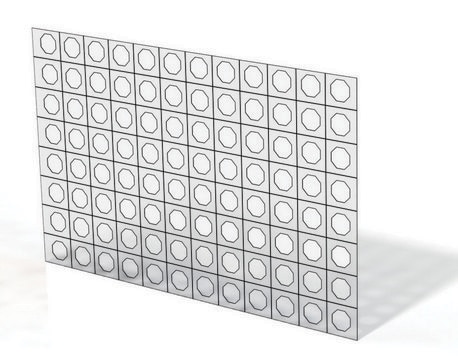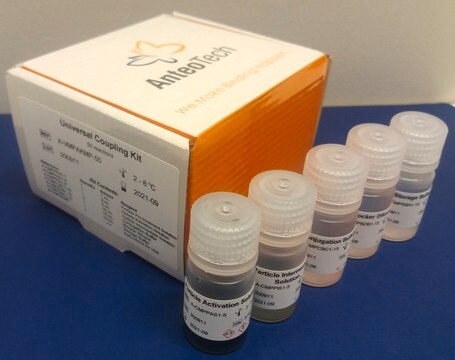GERPK0273
CyDye™ DIGE Cy®3 Minimal
Cytiva RPK0273, pack of 25 nmol
About This Item
Recommended Products
form
solid
feature
wetted part: no
packaging
pack of 25 nmol
manufacturer/tradename
Cytiva RPK0273
storage condition
protect from light
color
Red
solubility
cold water: soluble (Soluble in cold water and hot water)
shipped in
dry ice
storage temp.
−20°C
Related Categories
General description
CyDye™ DIGE fluors are available as minimal and saturation labeling dyes. The minimal dyes are intended for general 2-D application use where sufficient amounts of sample are available. The saturation dyes from the Scarce Sample Labeling Kit are designed to be used for applications where only small amounts of sample are available, for example in Laser Capture Microdissection. In total, three minimal dyes and two saturation dyes are available.
CyDye™ DIGE fluors are exceptional dyes for multicolor analysis, offering bright and intense colors with narrow excitation and emission bands. The fluors are spectrally distinct, making them highly suitable for multicolor detection. CyDye™ DIGE fluors utilize these benefits but are also size- and charge-matched specifically for 2-D DIGE using Ettan™ DIGE system.
Protein samples and the internal standard are each labeled with one CyDye™ DIGE Fluor minimal dye. These labeled samples are then combined, run on an isoelectric focusing gel in the first dimension, and separated by SDS-PAGE in the second dimension. Electrophoresis is simplified with Ettan™ IPGphor 3, or Multiphor II with Immobiline® DryStrip gels in the first dimension and Ettan™ DALTtwelve or Ettan™ DALTsix electrophoresis systems in the second dimension.
The ability to multiplex different CyDye™ DIGE Fluor minimal dye-labeled samples on the same gel means that the different samples will be subjected to exactly the same first- and second-dimension running conditions. Consequently, the same protein labeled with any of the CyDye™ DIGE Fluor minimal dyes and separated on the same gel will migrate to the same position on the 2-D gel and overlay. This limits experimental variation and ensures accurate within-gel matching.
Features and Benefits
- Allow detection of up to three prelabeled protein samples and standards on the same 2-D electrophoresis gel.
- Size- and charge-matched dyes enable co-migration of labeled samples within the gel.
- Bright and highly sensitive dyes allow the use of the minimal labeling technique.
- Minimal loss of signal during labeling, separation, and scanning.
- No change in signal over wide pH range used during first-dimension (IEF) separation.
- Discrete signal from each fluor with minimal cross-talk contributes to high accuracy.
Storage and Stability
Analysis Note
Legal Information
Cy3B: This product is manufactured under an exclusive license from Carnegie Mellon University and is covered by US patent number 6,133,445 and equivalent patents and patent applications in other countries.
CyQ (or Cy5Q or Cy7Q): These products are covered under US patent number 6,828,116 and equivalent patents and patent applications in other countries in the name of Cytiva.
CytoCy5S: The use of this product in an NTR gene reporter assay is the subject of US patent number 7,579,140 in the name of Cytiva.
CypHer5E: This product or portions thereof is manufactured under license from Carnegie Mellon University and is covered by US patent number 7,615,646.
Cy and CyDye, are - trademarks of Cytiva or one of its subsidiaries.
The purchase of CyDye products includes a limited license to use the CyDye products for internal research and development but not for any commercial purposes. A license to use the Cy and CyDye trademarks for commercial purposes is subject to a separate license agreement with Cytiva. Commercial use shall include:
1. Sale, lease, license or other transfer of the material or any material derived or produced from it.
2. Sale, lease, license or other grant of rights to use this material or any material derived or produced from it.
3. Use of this material to perform services for a fee for third parties, including contract research and drug screening.
If you require a commercial license to use the Cy and CyDye trademarks please contact LSlicensing@cytiva.com.
If you require a commercial license to use this material and do not have one, return this material unopened to Cytiva Bio-Sciences AB, Bjorkgatan 30, SE-751 84 Uppsala, Sweden and any money paid for the material will be refunded.
Signal Word
Danger
Hazard Statements
Precautionary Statements
Storage Class Code
13 - Non Combustible Solids
Choose from one of the most recent versions:
Certificates of Analysis (COA)
Sorry, we don't have COAs for this product available online at this time.
If you need assistance, please contact Customer Support.
Already Own This Product?
Find documentation for the products that you have recently purchased in the Document Library.
Articles
Troubleshooting table for 2D DIGE results lists problems, causes, and prevention methods for future experiments.
Troubleshooting table for 2D DIGE results lists problems, causes, and prevention methods for future experiments.
Troubleshooting table for 2D DIGE results lists problems, causes, and prevention methods for future experiments.
Troubleshooting table for 2D DIGE results lists problems, causes, and prevention methods for future experiments.
Protocols
This page shows how to perform a proteomic analysis of membrane proteins to identify and quantitate all proteins expressed in a cell or a tissue with products from Cytiva.
This page describes two-dimensional separation of protein samples with Cytiva products.
This page describes two-dimensional separation of protein samples with Cytiva products.
This page describes two-dimensional separation of protein samples with Cytiva products.
Our team of scientists has experience in all areas of research including Life Science, Material Science, Chemical Synthesis, Chromatography, Analytical and many others.
Contact Technical Service






